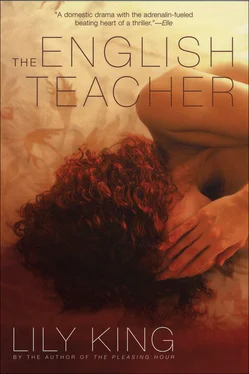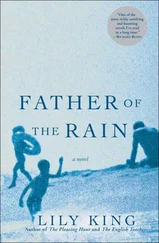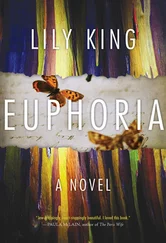It wasn’t that she needed a drink. It was the principle. It was not getting bossed around. She had a boss, a boss who’d put her on probation after sixteen years of indentured servitude. No one else was going to push her around — not tonight.
He would have hidden it somewhere. He was such a Yankee he wouldn’t have been able to throw it out. In the basement she groped around for the string that hung somewhere near the washing machine. She was always helplessly searching for the goddamn lights in this house. Her finger brushed it briefly, then it was gone again. “Fuck it,” she cried out. At that moment there was no one she wasn’t furious at. She was even pissed at Walt for dying on this lousy day. Finally she felt the soft twine in her hand and yanked. The string snapped off the chain, but the light was on. She went through every cupboard, every box, everywhere except the one place she guessed he’d put it. Finally, she had to look there, too.
She unzipped the garment bag, separated the flaps, and reached in. The dresses parted easily, as if they’d been expecting her. She ran her hand along the cardboard bottom. On one of their dates, probably that date at Emma’s he’d been going on about, Tom had read her what Fran had written for her mother’s funeral. It was a poem, and he kept it in his wallet. “She smelled like hyacinths and rain” was one of the lines. Vida remembered asking afterward if Fran had been reading T. S. Eliot at the time. She remembered, too, that this response had disappointed Tom and she didn’t understand what he could have expected. She’d never known Mary, had yet to meet Fran, and Tom himself was hardly more than a stranger who’d taken her out to dinner a few times. She didn’t know until now, until she’d buried her head in a rackful of Mary’s clothes, how accurate the description was.
But there was no bottle of bourbon.
She went back to the kitchen, trying not to think of poor Walt abandoned on the bedroom floor, to get Tom’s keys. The only place left was his car. She still had the goddamn string in her hand, and when she went to put it in the trash she saw it. Neck-down, nearly buried. She lifted it out. It had been drained and tossed out. Not such a skinflint after all.
She rummaged around for her old mushroom-colored raincoat beneath the pile on the hook and went out the back door. The padded right shoulder of the coat bobbed at her chin. She made straight for the half-dug grave.
Tom was in the hole up to his waist, crouched, spraying up dirt. Above the grave, they’d tied a flashlight to a tomato post. Fran stood beside the post, still shouting about roots. She stopped when Vida stepped into the flashlight’s faint outer ring.
The first thing Vida noticed when she stopped moving was that it was not raining. It hadn’t rained all day. The sky was clear and full of sharp stars. She had added this detail. In books it always rained while graves were being dug. Or perhaps it was Fran’s poem. Hyacinths and rain. She looked at Fran now, in her silver-studded jean jacket and fake fingernails. She hardly seemed capable of such a line.
Tom raised his head. He looked as if he’d been shoveling the dirt directly into his face.
A part of her wanted to laugh. Are you the First Clown or the Second, she might have said. But it was overruled by the anger that pinched and clawed with every molecule of her body. She didn’t know where to start.
Fran glanced at her with her usual disdain. “Your coat’s all twisted.”
“I don’t give a shit, Fran.”
She’d been so good up until now, but she was done being good, trying to squeeze into the little box they wanted to keep her in.
Tom leapt out of the hole as if she were holding a gun.
“Get the fuck away from me!” She remembered Helen on stage a few weeks ago, hollering, throwing pots. It felt great. It felt grand, stepping out of character in front of them all.
“Vida, come here. You’re upset.” He was reaching his arms out for her, arms that he’d withheld for so long now, tucking them tight under his body in bed in case they tried to wander. She wished she could chop them off.
“You fucking touch me I’ll kill you.”
She was aware now of Stuart, Peter, and Caleb staring at her from across the grave. Caleb had been crying. But Stuart and Peter had obviously been having a mud fight; their clothes were covered in splats of dirt. They had played like insensitive beasts while a grave was being dug.
What was her point? What had she come out to say? They were clustered together now, bewildered together at the edge of Walt’s grave, this family she did not belong to. She swung back toward the house. Her bag was by the front door. Keys on the hook. It was so simple to leave. She’d never been able to leave Peter before, never let herself fantasize, even momentarily, about leaving. But that feeling of wanting him away, that wretched feeling of him inside her, stuck to her, had always been there. Wanting to leave him was one of her most familiar but unrecognized impulses. Perhaps all these years of fearing she would kill him in her sleep were all about getting free of him. Exhilaration flooded her as she moved toward the front door. There was her car out on the road. She pressed her face against the front window. Had she known she would do this? Had she known it even when she issued her bewildering yes to Tom’s proposal? Had it been there all along, a tiny hopeful seed in the cold ground?
First stop would be O’Shea’s on the way out of town, where Tom had taken her once, back when he didn’t fuss about her having a drink. She hoped the same Irishman would be behind the counter. “What’ll do you?” he’d said. She loved that accent, right out of Dubliners, though he’d never read it, never even heard of Joyce, poor man.
Good-bye, Walt, she whispered and shut the front door. Her feet took her swiftly across the grass. She felt like one of Stuart’s girls, young and weightless, with nothing but mysteries ahead.
IN HISTORY CLASS PETER LIKED TO SIT IN THE BACK BESIDE THE WINDOW. From that angle he could see their old cottage and the playing field behind it, a patch of land he still considered his own backyard. That field looked now as it always did in winter: abandoned, soggy, the lime lines ravaged, one goal having fallen in a storm. The cottage, with its tidy yellow clapboards and shimmering black shutters, sat on the knoll above. A light was on in Peter’s old room, a baby’s room now. Peter, too, had been a baby in that room. He had been every age in that room with the sloping ceiling and crooked windows and the closet with the old wallpaper he used to peel when he was angry. What had he been angry about then? He couldn’t remember anything more specific than a dull thudding wanting feeling. He thought her marriage to Tom would quell it and for a little while it had, but the sensation was back again. Only now he didn’t simply want another change; he wanted to step out of the very skin of his life and into another.
His mother hadn’t come home last night. Tom had driven him to school and they’d barely spoken. Peter guessed Fran had probably told her father and Stuart about the kissing. They wouldn’t want him around for much longer if his mother didn’t come back — or even if she did.
When Tom had pulled around the circle to the front door, he’d said, “If anyone asks,” and seemed unable to go on.
“I’ll just say she’s sick.”
“Good. Okay then. Have a good one.”
There had been something about shutting the door on his stepfather, leaving him to drive away alone, that seemed cruel. Peter had stood on the pavement dumb and inert for an awkwardly long time. He’d wanted to say something encouraging to bring color back into Tom’s gray skin. Peter didn’t know his mother this far out of her orbit. Anything could happen now. “You, too,” he offered, then let the door go, softly.
Читать дальше












